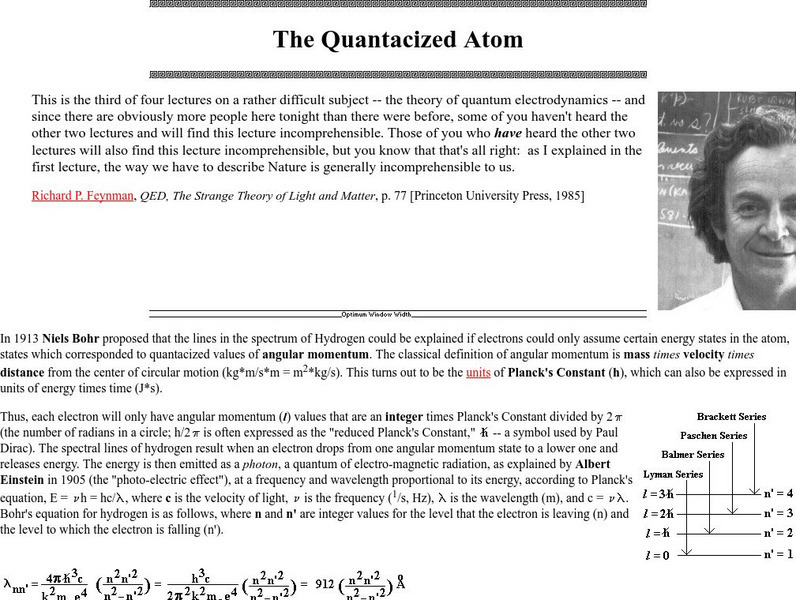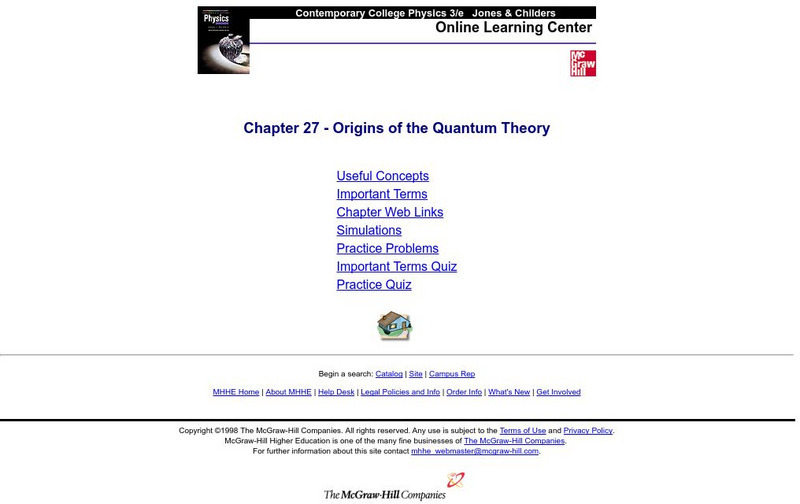Other
Rochester Institute of Technology: Basics of Nmr
A good overview of NMR. Some of the pictures are slow, but the explanation makes the concepts clear.
Georgia Department of Education
Ga Virtual Learning: Ap Chemistry: Atomic Theory
In this module students explore how matter is classified, the history of atomic theory, subatomic particles, modern atomic theory, electron configuration, the periodic table and its trends, and spectroscopy.
NASA
Nasa: Imagine the Universe: Supernovae Remnants
A brief description of supernova remnants with many embedded links to help define terms used in the description. The specific topics are age and the importance of remnants to us and the types. Definitions of key words are provided.
Other
Institute for Atomic and Molecular Physics
The FOM Institute for Atomic and Molecular Physics (AMOLF) is one of the five national research institutes of the Foundation for Fundamental Research on Matter (FOM). The research at AMOLF is focused on selected areas of atomic,...
TeachEngineering
Teach Engineering: Designing a Spectroscopy Mission
Students find and calculate the angle that light is transmitted through a holographic diffraction grating using trigonometry. After finding this angle, student teams design and build their own spectrographs, researching and designing a...
Nobel Media AB
The Nobel Prize: The Nobel Prize in Physics in 1907
At this site from The Nobel Foundation you can read about the scientist who won the Nobel Prize in Physics in 1907, Albert A. Michelson (1852-1931 CE). Here, you can read a detailed biography which provides information on Michelson's...
Concord Consortium
Concord Consortium: Stem Resources: Spectroscopy
Web-based activity walks learners through the use of spectroscopy in determining the identity of atoms and molecules by defining the excited state of atoms, the frequencies of emitted photons, and atoms' ability to absorb them....
Georgia State University
Georgia State University: Hyper Physics: Hydrogen Energies and Spectrum
This site from Georgia State University gives information on the transitions of electrons between energy levels. The energy levels for electrons in the hydrogen atom are discussed. The Rydberg equation is stated and electron transitions...
Texas Instruments
Texas Instruments: Chemistry of Autumn
This activity is designed to check student understanding of the chemistry of pigments and introduce spectroscopy using a relevant natural event.
University of Colorado
University of Colorado: Physics 2000: Balmer's Formula
A short description of a physics lab involving the determination of the wavelength of the four spectral lines in the hydrogen emission spectrum. Perhaps the most important part of the page is the picture of the spectrometer.
Friesian School
Proceedings of the Friesian School/the Quantacized Atom
A very lengthy page from friesian.com discussing Bohr's theory of electronic energy levels and the explanation of commonly observed atomic emission line spectra. The concept of a photon and Einstein's observation of the photoelectric...
Michigan Technological University
Michigan Technological University: Sir William Crookes
A biography of English experimentalist, William Crookes, who invented the radiometer.
Other
Southwest Research Institute: Distant Ek Os Kuiper Belt Electronic Newsletter
Distant EKOs is a scholarly newsletter about astronomical research on the Kuiper Belt. The bulk of information is accessed by clicking on the Current and Past Issues links. The newsletter issues contain, primarily, abstracts of scholarly...
PBS
Pbs Teachers: Stellar Fingerprints: The Spectra of Stars
Identify the composition of stars by applying the ideas of quantum theory. Investigate the field of spectroscopy, and examine the spectra of stars to locate the emission and absorption lines of hydrogen.
Famous Scientists
Famous Scientists: Gustav Kirchoff
Find out about the life and work of Gustav Kirchoff, who made contributions to the fundamental understanding of black-body radiation emitted by heated objects, spectroscopy, and electrical circuits.
Chemistry Collective
Chem Collective: Why Things Have Color
This tutorial demonstrates spectroscopy showing the dispersion of an object's light.
Science Struck
Science Struck: Emission Spectrum vs. Absorption Spectrum
Explains the difference between an emission spectrum and an absorption spectrum, and describes each as well as their applications.
McGraw Hill
Mc Graw Hill Companies: Origins of the Quantum Theory
An indexing page for Chapter 27 (Origins of the Quantum Theory) of the companion web site for McGraw Hill's Contemporary College Physics textbook. Includes several worthy pages with chapter notes, simple definitions, online computer...
Cosmo Learning
Cosmo Learning: Chemistry 3 B: Chemical Structure and Reactivity
A collection of video lectures from a chemical structure and reactivity course taught at the University of California, Berkeley. The course teaches conjunction, aromatic theory, carbonyl compounds, carbohydrates, amines, carboxylic acid....
Cosmo Learning
Cosmo Learning: Freshman Organic Chemistry Ii
A collection of video lectures from a freshman organic chemistry II course at Yale University. The course is a continuation the first organic chemistry course and covers topic. Lectures cover topics from simple and complex reaction...
Chem4kids
Chem4 Kids: Physical Chemistry Basics
Discover what physical chemistry is all about in this brief overview.
Other
Brockport High School: Energy Levels of Hydrogen Atom
From the Brockport High School Physics Labs web pages. Includes an excellent graphic depicting the energy levels of a hydrogen atoms and portraying the electron level transitions for the Lyman, Balmer, and Paschen series. Includes both...
University of St. Andrews (UK)
University of St. Andrews: Johann Jakob Balmer
Describes the life and scientific contributions of Johann Jakob Balmer. Discussion focuses on Balmer's contributions to the line spectra of hydrogen.
Cosmo Learning
Cosmo Learning: General Chemistry
A collection of video lectures from a general chemistry course taught at the University of California, Berkeley. The course teaches periodic table, chemical bonds, molecular shape, phase changes, chemical reactions, stoichiometry,...


















